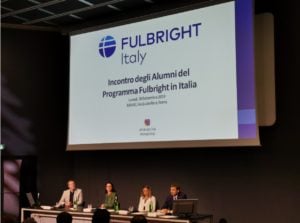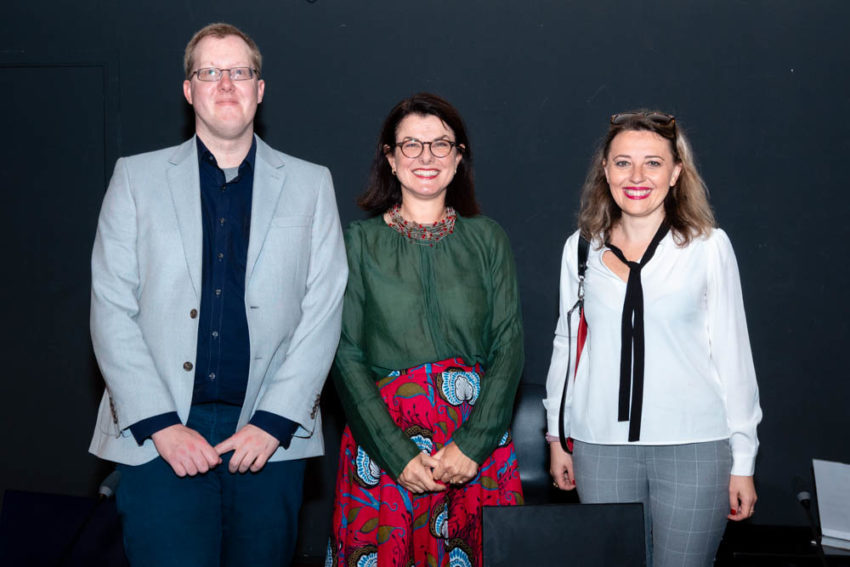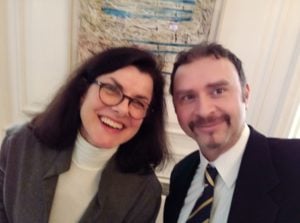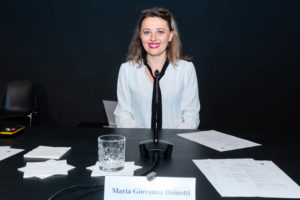
One year ago, the first Fulbright Alumni meeting took place in Rome at the MAXXI Museum. It was a great event that brought together Fulbrighters from all over Italy, reinforcing the connections within the Alumni network and the Commission itself. There, Prof. Maria Dainotti and Paolo Valore took the chance to meet in person and after one year we are now celebrating the publishing of an article they wrote together. Kudos to them!
Lets celebrate such fruitful collaboration, an outstanding and profitable example of success.
This is what Fulbright is for…

How the project was born?
The project was born thanks to a shared interest on selection biases in astrophysics and ontology. We are interested in investigating how the problem of overcoming selection biases could be ascribed to a more general context in philosophy and ontology, on one side, and on the possibility of application of ontology to scientific research, on another side.
We both were searching for colleagues in these realms of expertise and thought to leverage on the wide network offered by the Fulbright. We contacted the Director Dr. Paola Sartorio to have a suggestion on whom we could interact with and she wisely introduced each other and from that point our discussion started.
How the Fulbright event has facilitated this collaboration?
After this introduction via email, we had the opportunity to meet face to face for the first time at the Italian Fulbright Meeting event organized on the 30th of September 2019, in Rome at the MAXXI museum to celebrate the 71th year of activity of the Fulbright Italia. This event has been really a crucial starting point for our collaboration and we envision and acknowledge how the Fulbright network can be a future pool for expanding the discussion on this topic to a broader audience and possibly making it even more interdisciplinary.


How this collaboration has evolved?
We initiated a more formal collaboration by inviting each other in our respective Universities, Jagiellonian University in Krakow and University of Milan to give seminars on the topics of “Selection biases in astrophysics” and “The problem of categorization in ontology and their possible scientific applications”.
We started to formalize our ideas in a scientific paper that has been recently accepted in Foundations of Science, a refereed leading international journal, see a preprint for additional information.
What’s the project about?
The project deals with an innovative approach in contemporary philosophical ontology that focuses on our different metaphysical presuppositions. Such presuppositions involve, among others, the identification of relevant properties that lead us to uncover what it is the mere effect of selection preferences or biases, on one side and what is based on objective criteria, on the other side. A remarkable example of the application of a background metaphysical theory in astrophysics is the problem of selection biases in detecting cosmological objects, such as supernovae, galaxies, and gamma-ray bursts, among the farthest explosions ever observed after the Big Bang. We have shown that it is valuable to be aware of the importance of uncovering this type of background theory to better understand selection effects and to promote a novel approach in scientific research.
What are the future perspectives?
We are currently working on expanding the current discussion into a formal research project that investigates the limits and push further the frontiers of science’s ability to provide an explanation for our representation of reality. What is the weight of selection effects due to observational limits and objects categorization? Selection biases, if not properly evaluated, may lead to inaccurate physical parameters describing the mechanism of astrophysical objects and incorrect cosmological models. The deliverables and impacts will be an improved estimate of the most reliable cosmological parameters describing our Universe and a better comprehension of the ontological framework of the objects of our research.

Maria Dainotti: Assistant Professor at Jagiellonian University and concurrently serving as an affiliated scientist at Space Science Institute in Colorado and at Stanford University, is author of 83 publications, 40 refereed, 19 as a first author or shared first author and first and sole author of a book published by IOP, recipient of several fellowships and scholarships such as the Fulbright, the Marie Curie’ and the American Astronomical Society Chretienne Fellowships. My research expertise includes High energy astrophysics, gamma-ray bursts (GRBs), selection bias, statistical methods for astronomical data and active galactic nuclei. I am the discoverer of two Dainotti relations among several properties of GRBs afterglows between the luminosity at the end of the plateau phase, La, and its rest frame duration, Ta, and in GRB prompt-afterglow between La and the peak luminosity of the prompt mission, Lpeak. The application of these relations in combination with supernovae Type Ia (SNe Ia) and cosmic microwave background radiation (CMB) led to obtaining compatible results with these previous probes showing the validity of these relations as cosmological tools.
Paolo Valore: Paolo Valore is Professor of Contemporary Metaphysics at the University of Milan and formerly of Theoretical Philosophy at the Polytechnic University of Milan, Italy. Recipient of several fellowships and scholarships, such as the Fulbright (twice), head and scientific director of the interuniversity project FIRB “OntoForMat: Classical Paradigms and Theoretical Foundations in Contemporary Research in Formal and Material Ontology”. Fulbright Fellow at NYU (USA); Visiting Scholar at Columbia University (New York, USA), Rutgers University (New Jersey, USA) and at Complutense University of Madrid (Spain); Visiting Professor at the Higher School of Economics (Moscow, Russian Federation). He is author of 10 books and more than 100 among articles and book chapters. His last book is Fundamentals of Ontological Commitment (Berlin-Boston MA: De Gruyter). His research field is conceptual analysis, formal and applied ontology, and metaphysics of science.
